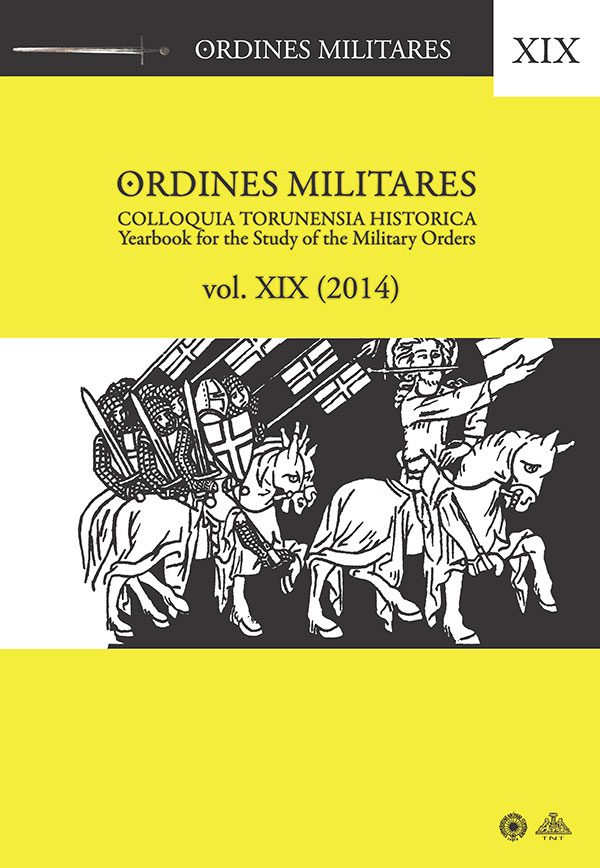Networks around Jasper von Munster. Teutonic Order during the Livonian War of Coadjutors in 1556
DOI:
https://doi.org/10.12775/OM.2014.005Keywords
political history, administration, conflict, Teutonic Order, Livonia, War of Coadjutor’sAbstract
Livonian war of coadjutor’s broke out when the estates protested against the election of Christopher of Mecklenburg as a coadjutor of archbishop of Riga. At the same time, another conflict occurred, when Land Marshal of the Teutonic Order in Livonia, Jasper von Munster protested against the election of Wilhelm von Furstenberg as the coadjutor of the Livonian Master. As a result of the latter, Jasper was deposed and had to flee to Kaunas, from where he fought in vain for his restitution. This article aims first to identify and analyse the political network supporting Jasper inside of the Teutonic Order, and second to study the way the administrative network of the Order functioned during the conflict. It appears that Jasper’s political connections did not suffice to form his “party”, which could divide the chapter of the Order. During the conflict, the officials of the Order mostly retained their loyalty to the organization. Jasper was able to form a small retinue or a court of a kind, which consisted of local nobility, minor officials and even some fellow brethren of the Order, but it was not enough to confront the rest of the Order.
References
Bergengrün, Alexander. „Herzog Christoph von Mecklenburg, letzter Koadjutor des Erzbistums Riga. Ein Beitrag zur livlandischen und Mecklenburgischen Geschichte.” Edited by Stefan Hartmann and Urlich Müller. Köln-Weimar-Wien: Böhlau, 1996-2008.
Botticher, Christoph. Wunderbarliche Handlung des jetzigen Meysters aus Leyflandt unnd seines Stallbruders oder Coadiutorn Wilhelmen Furstenberg und irem anhang. Königsberg: Daubmann, 1556.
„Caspar von Munster’s Vertheidigungsschrift.” Mittheilungen aus dem Gebiete der Geschichte Liv-, Ehst- und Kurlands 10 (1861): 111-160.
Henning, Salomon. „Lifflendische Churlendische Chronica.” In Scriptores Rerum Livonicarum, Vol. 2. Riga-Leipzig: Frantzen, 1853.
Renner, Johannes. Livlandischen Historien 1556-1561, edited by Peter Karstedt. Lübeck: Schmidt-Röhmhild, 1953.
Russow, Balthasar. „Chronica der Poruintz Lyfflandt.” In Scriptores Rerum Livonicarum, Vol. 2. 1-194. Riga-Leipzig: Frantzen, 1848.
Arbusow, Leonid. „Livlands Geistlichkeit vom Ende des 12. bis ins 16. Jahrhundert, III. Nachtrag.” Jahrbuch für Genealogie, Heraldik und Sphragistik 1911/1912/1913: 1-432.
Fenske, Lutz and Militzer, Klaus., edit. Ritterbruder im livlandischen Zweig des Deutschen Ordens. Köln-Weimar-Wien: Böhlau, 1993.
Hartmann, Stefan. „Neue Quellen zur livlandischen Koadjutorfehde 1555/56.”, in: Aus der Geschichte Alt-Livlands. Festschrift fur Heinz von zur Muhlen zum 90. Geburtstag, edited by Bernhart Jähnig and Klaus Militzer, 275-306. Münster: Lit, 2004.
Hansen von, Gotthard. Regesten aus zwei Missivbuchern des XVI. Jahrhunderts im Revaler Stadt-Archiv. Reval: Reval Kluge, 1895.
Lange, Thomas. Zwischen Reformation und Untergang Alt-Livlands. Der Rigaer Erzbischof Wilhelm von Brandenburg im Beziehungsgeflecht der livlandischen Konfederation und ihrer
Nachbarlander. Hamburg: Verlag Dr. Kovac, 2014.
Maasing, Madis. „Saare-Laane ja koadjuutorivaenus: keskaegse Liivimaa viimased kodusojad.” Ajalooline ajakiri 132 (2010): 115-151.
Mol, Hans J. „Verrader van Lijfland? De Nederlandse ordemaarschalk Jasper van Munster en het begin van de Lijflandse crisis, 1554-1557.” In Vechten,bidden en verplegen, 235-268. Hilversum: Verloren, 2011.
Müller, Ulrich. „Erzbischof Wilhelm von Riga und die Reformation in Livland 1535-1563” In Preussen und Livland im Zeichen der Reformation, edited by Arno Mentzel-Reuters and Klaus Neitmann, 241-343. Osnabrück: Fibre, 2014.
Neitmann, Klaus. „Rat und Ratsgebietiger Wolters von Plettenberg. Beobachtungen zum
Regierungs- und Verwaltungsstil des Ordensmeisters.” In Wolter von Plettenberg und das mittelalterliche Livland, edited by Norbert Angermann and Ilgvars Misans, 85-111. Lüneburg 2001.
Popov, Vadim E. and Filjuškin, Aleksandr I. „»Voina koad’jutorov« i Pozvol’skie soglašenija 1557 g.” Studia Slavica et Balcanica 6 (2009): 151-184.
Wieser, Klemens. Nordosteuropa und der Deutsche Orden. Kurzregesten. Vol. 1. Bad Godesberg: N.G. Elwert, 1969.
Downloads
Published
How to Cite
Issue
Section
License
CC BY ND 4.0. The Creator/Contributor is the Licensor, who grants the Licensee a non-exclusive license to use the Work on the fields indicated in the License Agreement.
Stats
Number of views and downloads: 389
Number of citations: 0



